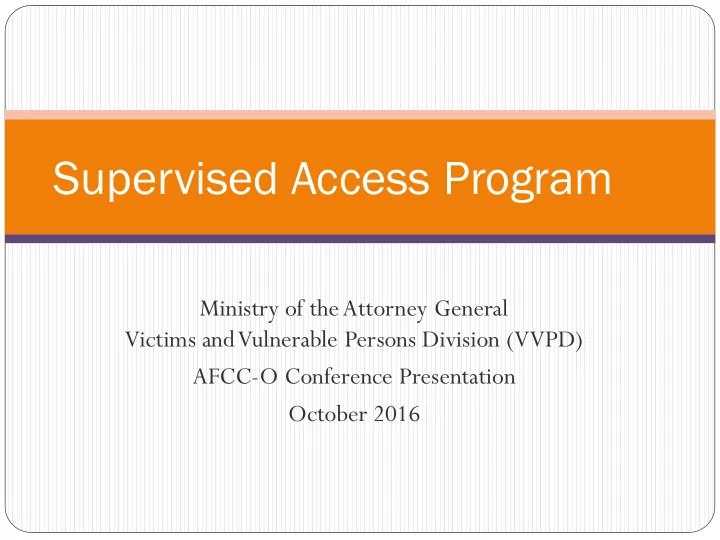

Supervised Access Program Ministry of the Attorney General Victims and Vulnerable Persons Division (VVPD) AFCC-O Conference Presentation October 2016
Brief Background Provide a safe, neutral, child focused setting for visits and exchanges between child and non-custodial parent or other person, such as a grandparent, where there is a concern for the safety of the child and/or the adults. MAG program created in 1992 to fill the gap in service for family law cases; full provincial expansion only completed in 2003 to all court districts. Since 1992 went from 14 sites to the current 100 plus. 35 nonprofit service providers with TP agreements with MAG MAG program for custody and access NOT child protection Different from CAS supervised access for kids in care - Facilitation not enforcement; voluntary not mandated No legislation or regulation of supervised access except CLRA Section 34 (1) and (2) – centres must agree to provide service and can refuse or terminate services or provide service based on hours of operation and availability. Also Amendments to CFSA Sec 57.1(1) and 58: order for custody and subsequent order for access as if made under CLRA Over 70,000 visits and exchanges/year; 2,600 families; 3,100 children
Accountability No provider, private or public, is accountable to the Ministry except those with which we have a service agreement. Ministry does not track or recommend other providers so ask questions before referring to them. Each centre has a community advisory committee or board which makes it accountable to the community
Why Supervised Access? Safety is the issue: history/allegations of domestic violence, abuse (emotional/physical), abduction, mental health problems, substance abuse, interference with access, interrupted/non- existent relationship with child, ongoing conflict, physical or developmental challenges that impact safe parenting (adult and/or child) 99.9% of visits and exchanges occur safely and without incident (program statistics 2015) Why not family and friends or public places? Not neutral, not consistent, not necessarily safe, no notes or follow up.
Services Fully supervised visits on site; supervised exchanges – transfer of children from one parent to the other for unsupervised visits off site Centres are community based and have differing hours of operation and fees (max. fees set by Ministry – reasonable and may be lowered or waived based on financial need) No service boundaries so you can refer families who live outside of a district or area to any centre Each centre has its own intake so family cannot just move from one centre to another Services are on site. Centres do not provide transportation. Reports of factual observations: centres do not make recommendations or give opinions – we cannot make predictions about access outside of the centre
How Does It Work? Referral by court order (CLRA/Divorce Act) or by prior written agreement of parties Each party contacts centre to set up separate intake – never contact between parties Coordinator determines if centre can provide service – safety, availability – parties sign agreements for service Centre sets up schedule based on availability and hours of operation and needs of the family Child orientation scheduled prior to first visit/exchange
Day of Visit/ Exchange Parties arrive/depart at staggered intervals (NO contact) Child never left alone while on site including washroom; staff always in the room Centres are mostly daycare or community centre environments, some homelike Visiting parent and child/ren play, eat, talk – parent may bring activities or centres have toys, games, crafts Staff will intervene to promote safety (physical or emotional) Not all centres have outdoor play areas Always at least 2 staff on site; group environment means more than one family may be visiting at one time Some centres have one volunteer/staff assigned to each family; others may have 2 staff overseeing 2-3 families
Case – Related Mental Health Issues Dad visiting at centre with 4 year old son; also visiting newborn daughter at the centre (child of another relationship) Originally dad did not reveal mental health concerns because he was afraid he would be treated differently (badly) based on previous experiences with other types of services He originally lost service because his behaviour was erratic, and threatening; service reinstated with conditions; issues of accommodation of anxiety disorder Within a year he achieved his goal of unsupervised visits
Grandparent Access Letter of thanks from grandparents to a centre Used centre for a few months for court ordered supervised access to see grandchildren Expressed how the centre made a difficult situation easier for them through the compassion and kindness of staff Now seeing the children unsupervised and reuniting them with cousins and other family members.
Culture of Collaboration Peer Review: Centre coordinators go in teams of 2 to visit one another’s centres every 3 years. Review is for learning and service improvement; not an audit Regional structure: there is a regional team lead who collects the materials from the review teams and sends the information to Ministry program for follow- up when required SBP Manual (Standards & Best Practice Manual): developed and revised with coordinators/service providers PDC (Professional Development Committee): MAG/Coordinator collaboration to develop training
Super ervised ised Ac Acces ess s Program am Web Site: e: http://www.attorneygeneral.jus.gov.on.ca/english /family/supaccess.asp On the web site you will find: List of MAG Supervised Access Centre contact information Information for Court Orders or Agreements Suggested Wording for Orders or Agreements
Key Points Visit our web site on www.attorneygeneral.jus.gov.on.ca Contact local Ministry-funded supervised access centres: speak to the Centre Coordinator Some but not all Centres accept volunteers and student placements Contact the Ministry Program if you have any questions. We are always pleased to speak with you. Judy.Newman@ontario.ca Maribeth.Christensen@ontario.ca THANK YOU.
Recommend
More recommend